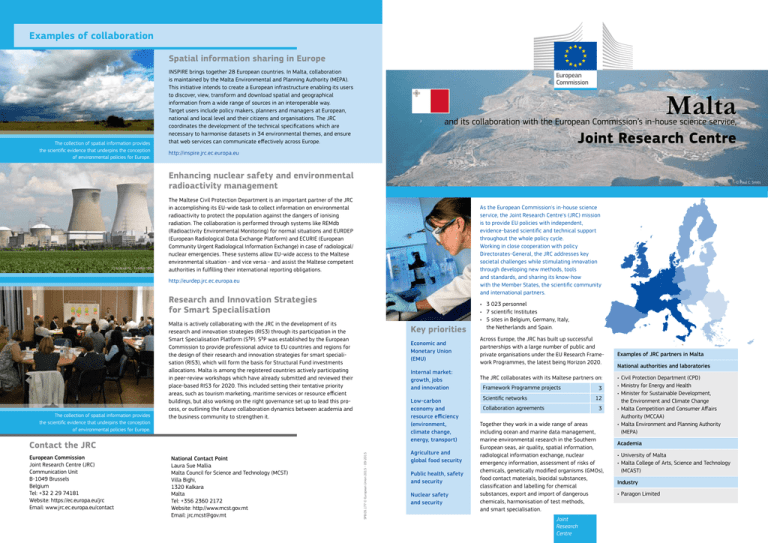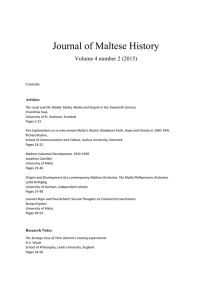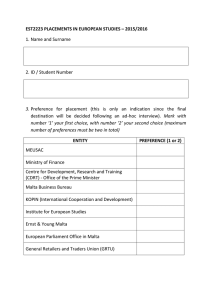Malta Joint Research Centre Examples of collaboration
advertisement

Examples of collaboration Spatial information sharing in Europe The collection of spatial information provides the scientific evidence that underpins the conception of environmental policies for Europe. INSPIRE brings together 28 European countries. In Malta, collaboration is maintained by the Malta Environmental and Planning Authority (MEPA). This initiative intends to create a European infrastructure enabling its users to discover, view, transform and download spatial and geographical information from a wide range of sources in an interoperable way. Target users include policy makers, planners and managers at European, national and local level and their citizens and organisations. The JRC coordinates the development of the technical specifications which are necessary to harmonise datasets in 34 environmental themes, and ensure that web services can communicate effectively across Europe. Malta and its collaboration with the European Commission’s in-house science service, Joint Research Centre http://inspire.jrc.ec.europa.eu Enhancing nuclear safety and environmental radioactivity management © spacekris - Fotolia.com © Paul C. Smits The Maltese Civil Protection Department is an important partner of the JRC in accomplishing its EU-wide task to collect information on environmental radioactivity to protect the population against the dangers of ionising radiation. The collaboration is performed through systems like REMdb (Radioactivity Environmental Monitoring) for normal situations and EURDEP (European Radiological Data Exchange Platform) and ECURIE (European Community Urgent Radiological Information Exchange) in case of radiological/ nuclear emergencies. These systems allow EU-wide access to the Maltese environmental situation - and vice versa - and assist the Maltese competent authorities in fulfilling their international reporting obligations. As the European Commission's in-house science service, the Joint Research Centre's (JRC) mission is to provide EU policies with independent, evidence-based scientific and technical support throughout the whole policy cycle. Working in close cooperation with policy Directorates-General, the JRC addresses key societal challenges while stimulating innovation through developing new methods, tools and standards, and sharing its know-how with the Member States, the scientific community and international partners. http://eurdep.jrc.ec.europa.eu Research and Innovation Strategies for Smart Specialisation The collection of spatial information provides the scientific evidence that underpins the conception of environmental policies for Europe. Malta is actively collaborating with the JRC in the development of its research and innovation strategies (RIS3) through its participation in the Smart Specialisation Platform (S³P). S³P was established by the European Commission to provide professional advice to EU countries and regions for the design of their research and innovation strategies for smart specialisation (RIS3), which will form the basis for Structural Fund investments allocations. Malta is among the registered countries actively participating in peer-review workshops which have already submitted and reviewed their place-based RIS3 for 2020. This included setting their tentative priority areas, such as tourism marketing, maritime services or resource efficient buildings, but also working on the right governance set up to lead this process, or outlining the future collaboration dynamics between academia and the business community to strengthen it. Key priorities Economic and Monetary Union (EMU) Internal market: growth, jobs and innovation Low-carbon economy and resource efficiency (environment, climate change, energy, transport) European Commission Joint Research Centre (JRC) Communication Unit B-1049 Brussels Belgium Tel: +32 2 29 74181 Website: https://ec.europa.eu/jrc Email: www.jrc.ec.europa.eu/contact National Contact Point Laura Sue Mallia Malta Council for Science and Technology (MCST) Villa Bighi, 1320 Kalkara Malta Tel: +356 2360 2172 Website: http://www.mcst.gov.mt Email: jrc.mcst@gov.mt SPB.05.177 © European Union 2015 - 09-2015 Contact the JRC Agriculture and global food security Public health, safety and security Nuclear safety and security •• 3 023 personnel •• 7 scientific Institutes •• 5 sites in Belgium, Germany, Italy, the Netherlands and Spain. Across Europe, the JRC has built up successful partnerships with a large number of public and private organisations under the EU Research Framework Programmes, the latest being Horizon 2020. The JRC collaborates with its Maltese partners on: Framework Programme projects Scientific networks 3 12 Collaboration agreements 3 Together they work in a wide range of areas including ocean and marine data management, marine environmental research in the Southern European seas, air quality, spatial information, radiological information exchange, nuclear emergency information, assessment of risks of chemicals, genetically modified organisms (GMOs), food contact materials, biocidal substances, classification and labelling for chemical substances, export and import of dangerous chemicals, harmonisation of test methods, and smart specialisation. Joint Research Centre Examples of JRC partners in Malta National authorities and laboratories •Civil Protection Department (CPD) •Ministry for Energy and Health •Minister for Sustainable Development, the Environment and Climate Change •Malta Competition and Consumer Affairs Authority (MCCAA) •Malta Environment and Planning Authority (MEPA) Academia •University of Malta •Malta College of Arts, Science and Technology (MCAST) Industry •Paragon Limited The Joint Research Centre and Malta JRC collaboration with Maltese research organisations – examples Framework Programme projects The JRC is involved in more than 150 collaborative research projects and networks as part of the EU's Framework Programmes for research and innovation – the latest being Horizon 2020 – under the same conditions as other organisations. This enables the JRC to form partnerships with major European and international research players. Project activities may involve work carried out at JRC facilities which results in increased access to and use of the JRC’s specialised infrastructures and databases by scientists and researchers. Some examples of Framework Research and Innovation Programme projects which involve Malta partners are: Scientific networks The JRC collaborates with organisations which share a common interest in specific research areas. This collaboration is essential for the JRC’s work on harmonising and validating methods and measurements, establishing common standards, and providing scientific and technical support for the implementation of EU legislation. The JRC collaborates with over 1000 partner organisations in around 100 institutional networks worldwide. Some examples of scientific networks which involve Maltese partners are: Air Quality Reference Laboratories (AQUILA) European Community Urgent Radiological Information Exchange (REM-ECURIE) Working Group on the identification of PBT and vPvB Substances (WG PBT) This information exchange system was set up to allow for the early notification and exchange of information in the event of a radiological or nuclear emergency. The Working Group comprises experts from Member States' competent authorities with a mandate to identify Persistent Bioaccumulative and Toxic substances (PBT), and very Persistent and very Bio-accumulative (vPvB) substances in the environment. •• Civil Protection Department Radioactivity Environmental Monitoring data bank (REM-REMdb) •• Malta Environment and Planning Authority A data bank for information provided by Member States on levels of radioactive contamination of the various compartments of the environment (air, water, soil) which is used to produce annual monitoring reports. •• Malta Environment and Planning Authority SeaDataNet II: Pan-European infrastructure for ocean and marine data management (SEADATANET II) •• University of Malta The overall objective of this project is to upgrade the present infrastructure into an operationally robust system and one for providing up-to-date and high quality access to ocean and marine metadata, data and data products. Policy-oriented marine Environmental Research in the Southern EUropean Seas (PERSEUS) A network of Air Quality Reference Laboratories which carries out quality assurance programmes with the participation of national reference laboratories in Member States. European Network of GMO Laboratories (ENGL) •• Malta Environment and Planning Authority A network that aims to solve technical and analytical problems which laboratories face in the food sector and the environment. It aims to harmonise Member State approaches in relation to genetically modified organisms (GMOs). •• University of Malta EU National Coordinators for Testing Methods (EU NCTM) •• Malta Competition and Consumer Affairs Authority In order to ensure a harmonisation of test methods in as wide an international context as possible, according to the principle of Mutual Acceptance of Data, the Commission and the JRC participates in the OECD Test Guidelines Programme. Technical Meeting on biocidal substances (TM Biocides) •• Malta Competition and Consumer Affairs Authority The Biocides Technical Meeting is a subsidiary body which provides technical and scientific support to Member State authorities and the European Commission for the approval of active substances in biocidal products. This project aims to identify the interacting patterns of natural and human-derived pressures on the Mediterranean and Black Seas, assess their impact on marine ecosystems and to design an effective and innovative research governance framework based on sound scientific knowledge. Official EURL-NRL Network on Food Contact Materials This is the official network of national reference laboratories which have been nominated by their competent authorities to support the European Reference Laboratory for Food Contact Materials. Technical Committee on Classification and Labelling (TC C&L) Enhancing ecoSysteM sERvices mApping for poLicy and Decision mAking (ESMERALDA) Infrastructure for Spatial Information in Europe (INSPIRE) •• Malta Environment and Planning Authority The committee prepares the classification and labelling proposals for chemical substances under the Dangerous Substances Directive (Directive 67/548/EEC). The INSPIRE initiative facilitates the sharing of information between Member States about the environment or on activities that may have a direct or indirect impact on the environment. Working Group for customs collaboration on Edexim (WG EDEXIM) •• Malta College of Arts, Science and Technology ESMERALDA aims to deliver a flexible methodology for pan-European, national and regional ecosystem mapping and assessment in relation to policy requirements in the areas of planning, agriculture, climate, and water. Mapping and assessment of ecosystems and their services are core to the EU Biodiversity Strategy. •• Ministry for Energy and Health •• Malta Competition and Consumer Affairs Authority This project carries out state-of-the-art assessment of risks of chemicals, and promotes the exchange of information and views on quantitative and qualitative structure-activity relationships (QSARs). The information contained in this leaflet is correct at the time of compilation but may be subject to change. Collaboration agreements The JRC has around 200 operational collaboration agreements and Memoranda of Understanding with public and private research organisations, universities, and national and international bodies. The majority of these agreements concern joint research, information sharing and the exchange of personnel. Some examples of collaboration agreements which involve Maltese partners are: Memorandum of Understanding on the EUropean Radiological Data Exchange Platform (EURDEP) •• Malta Environment and Planning Authority This Memorandum of Understanding relates to Maltese participation in the EURDEP system during routine and emergency conditions. EURDEP is a network for the exchange of automatic monitoring data. It makes radiological monitoring data from most European countries available in near real-time. Collaboration agreement on nuclear emergency information •• Civil Protection Department •• Malta Competition and Consumer Affairs Authority •• Malta Competition and Consumer Affairs Authority Technical Committee for New and Existing Substances (TC NES) •• Malta Competition and Consumer Affairs Authority The European Database for the Export and Import of Dangerous Chemicals (EDEXIM) provides classification and labelling information for substances covered by Regulation (EC) 689/2008. This working group was set up to enhance collaboration between customs. This collaboration agreement deals with nuclear emergency information exchange with EU Member States under Council Decision 87/600/Euratom.




